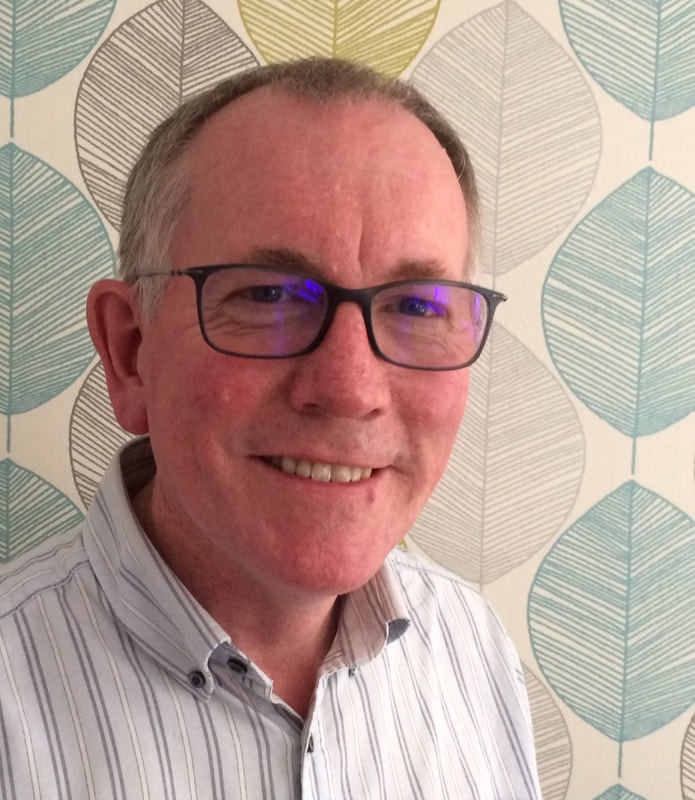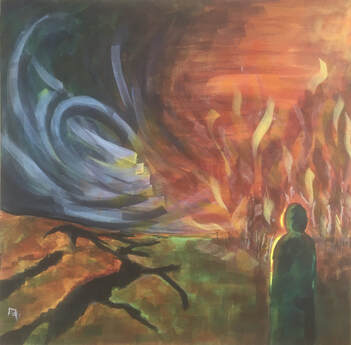 I feel safe and secure in my cave, my home, while the world rages and only enters via the screen in the corner of the room. I have happily excluded myself from engaging, other than from a distance, glad that Covid restrictions enable me to feel I am doing the right thing. However, I do feel a discomfort, even an anger, which I trust is righteous, because what I witness is far from the good creation that was God's in the beginning. There is great need for salvation, yet people listen only to themselves and what seems good to them. Outside, firestorms, floods, hurricanes, earthquakes - political argument, armed conflict, virus - all bring our world towards a breaking point and I know that change needs to come. There is much in crises, natural and human, that seems to speak of judgment, yet God's voice is not heard in them alone. Attention is drawn to our human failings, but it is the still small voice within that we must listen to. It is the Spirit within which moves us to the creative that lies beyond judgment. God will not add to our sense of despair and impotence at the chaos of the world, but rather encourage us with his gifts. God's still small voice called Elijah from his cave of retreat and security to anoint kings and prophet (1 Kings 19). When we feel at the end of the road, not able to do anything significant to change the situation, are we, perhaps, called to the same - to anoint those who are in positions to act and bring change - those with particular gifts, those who seek to govern or lead, those who seek to shape our human life and those who will speak for You in our world. What then does it mean for us to anoint others? It begins with the recognition of and an appreciation for God's gifts in them. Then to bless, encourage and share in, as far as we are able, this move towards the new creation. Practically it may mean things such as: Engagement in the political process, enabling our voice to be heard between elections. Support and affirmation for causes bringing change that we understand to be from God - climate action, building peace, enabling the less able ..... To support those who seek our deeper understanding of God's purposes, giving attention to the prophetic voices speaking into particular situations.
0 Comments
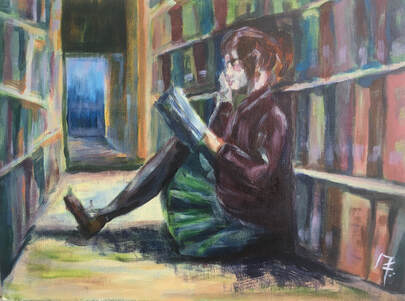 There are many stories of which we are each part. Our family, our nation, groups, causes etc. are just some. We are all part of the story of creation, God's story, key elements of which Christians understand are told in the Bible. The story stretches from creation in Genesis to new creation in the book of Revelation, with us somewhere between the two, playing our part, filling in the detail, shaping the plot. I recall learning about the various books of the Bible, constructing a picture of a library covering history, song, prophecy, Gospels, letters and much more. It is absorbing to reflect on one's own story, the larger stories of which one is a part and that greater story which is God's. The fruitful reflection for each of us is around what part we play in God's creation, redemption and new creation. A sermon I heard challenged me with the question put by Jesus to a blind man he was healing - "Do you see anything?" Reflecting on the experience of the man as he regained his sight and saw Jesus, my mind conjured up the words of Simeon, the man who greeted Mary and Joseph as they went to present the new-born Jesus in the temple and to make their sacrifice.
The painting is a visual reflection on the Gospel passage. You may care to use both in a time of reflection. Luke 2. 22-35 When the time came for the purification rites required by the Law of Moses, Joseph and Mary took him to Jerusalem to present him to the Lord (as it is written in the Law of the Lord, ‘Every firstborn male is to be consecrated to the Lord’), and to offer a sacrifice in keeping with what is said in the Law of the Lord: ‘a pair of doves or two young pigeons’. Now there was a man in Jerusalem called Simeon, who was righteous and devout. He was waiting for the consolation of Israel, and the Holy Spirit was on him. It had been revealed to him by the Holy Spirit that he would not die before he had seen the Lord’s Messiah. Moved by the Spirit, he went into the temple courts. When the parents brought in the child Jesus to do for him what the custom of the Law required, Simeon took him in his arms and praised God, saying: ‘Sovereign Lord, as you have promised, you may now dismiss your servant in peace. For my eyes have seen your salvation, which you have prepared in the sight of all nations: a light for revelation to the Gentiles, and the glory of your people Israel.’ The child’s father and mother marvelled at what was said about him. Then Simeon blessed them and said to Mary, his mother: ‘This child is destined to cause the falling and rising of many in Israel, and to be a sign that will be spoken against, so that the thoughts of many hearts will be revealed. And a sword will pierce your own soul too.’ There are echoes in the past for this passage. Psalm 119.123 My eyes fail, looking for your salvation, looking for your righteous promise. 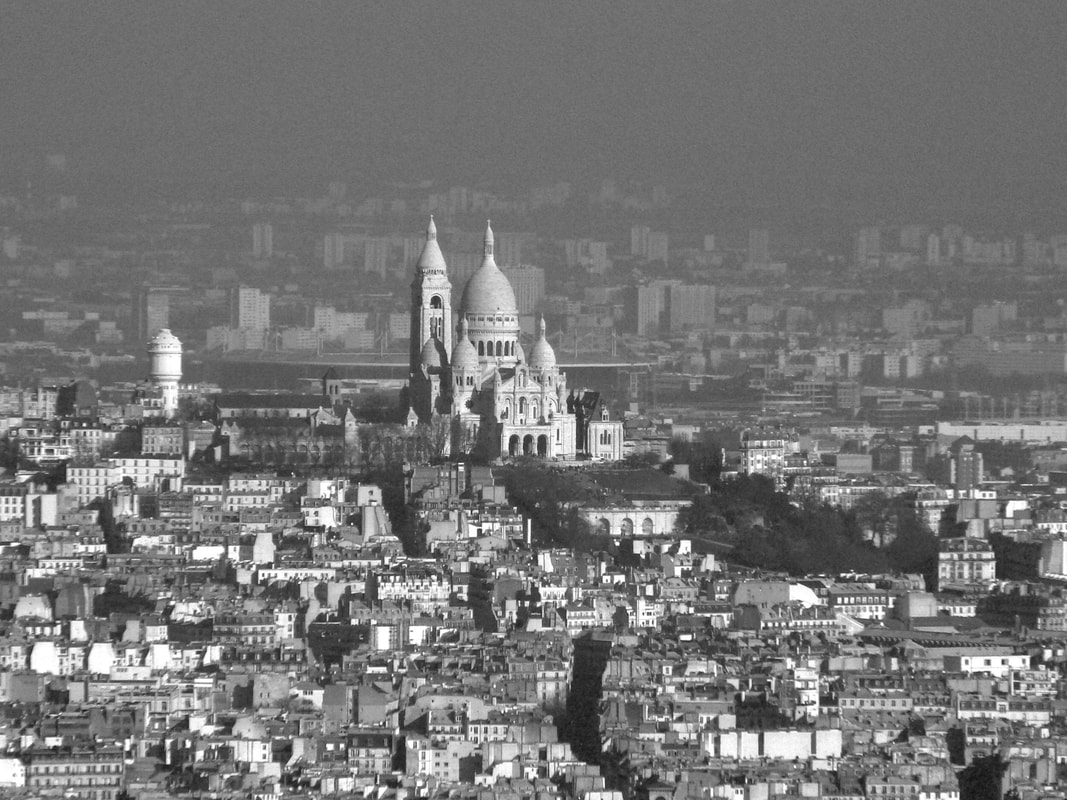 From the viewing point on the top of the Montparnasse Tower in Paris the evening light makes the familiar edifice of the Sacré Coeur stand out over the city that surrounds it. The distant suburbs disappear in the haze, but the houses of Montmartre are varied shades, with some shining as light as the church. The image for me is of the Church of Christ witnessing to the city, but not only through its structural institution. It is also, and more importantly, those who witness in their homes and everyday lives. The sunlight does eventually fade, but it moves on elsewhere and the rotations of day and night symbolise for us the eternity within which God dwells. By contrast the flood-lit Sacré Coeur (image below), attractive in the later evening, will be plunged into darkness. The human-created light is of a different quality all-together and has nothing of the eternal about it. So it is, we are called to reflect the light of Christ in the world in which we live rather than offer ourselves alone. The Church of Christ, in its grand architecture or its humble homes, can only reflect and witness. I find another contrast interesting too. Montmartre is perhaps best known as a village of artistic creativity and its night-life, so perhaps it is not the brightest witness to Christian values. However, its name as the Mount of Martyrs springs from the martyrdom of Denis, a local bishop, who was beheaded in 250ad for preaching the Christian gospel. Questions are raised in my mind around how Christian witness may be made in those darker corners of human life. The institutional church stands apart and is often seen as only judgemental and distant, but the personal witness of Christians in everyday life is where the light may be reflected into dark corners. And of course the word ‘martyr’ means ‘witness’! These four paintings carry the title 'My Back Yard'. So often we practice 'NIMBYism', being keen to keep certain people at a distance, or not realising how important they are to us. Others are simply not part of our awareness, yet fulfil a vital role. I count myself privileged that those represented through these paintings have been important influences in my life, and that I have been led to recognise the fact. These paintings relate to Seafarers, homeless people, those who live with impaired intellectual capacity (learning disabilities, dementia), refugees. A period as a Director of the Sailors' Society (chaplaincy to seafarers around the world) made me aware of our dependence on these folk who sacrifice much of family life etc. to bring 90% of all we consume to the UK by sea. Working with Solihull Churches Action on Homelessness highlighted the fact that street-sleepers, whose situation challenges us when shopping, are only a small percentage of the issue, with many others in refuges or sofa-surfing. They are all around us and not always 'down and out'. The pianists are from the L'Arche Community for people with intellectual disabilities and assistants. The scene begs the question, who is guiding who? We all have gifts to give or receive - relationships are always 2-way. Work with RESTORE in Birmingham and in helping to settle Syrian refugees in Solihull has put faces to the thousands more represented in news bulletins. It is too easy to consider Calais as none of our business. In these ways I am conscious of the place of these in my life, but continue to be challenged by the teaching and example of Jesus in the light of which I am aware of my failings.
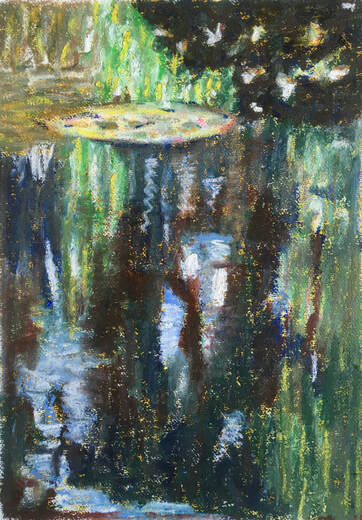 How do I find beauty in this mess of pigment, oil and scribble? Is it by capturing a memory of this, or another place, in times past - the sun’s warmth, the buzz of insects, the lazy fish gliding too-and-fro, a gentle breeze caught in the willow fronds, the vibrant colours flickering across the water? Not entirely, for you may have passed by too quickly or not have been there at all. It is not through great measures of planning on my part, as the artist. I am aware how random much is and that I am not well-trained in the study of colour and light. I strongly sense the image is as much a gift to me, as it is to any viewer and my question is ‘How did I do that?'. Is it natural intuition or does the Spirit move across the waters of my mind - bringing light, life and colour into being - bringing a strange order to the chaos of stroke and smudge - re-creating what the eye perceives and shaping a fresh beauty for others to behold? I believe so. It is grace! 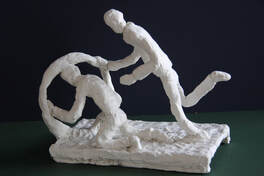 Two disciples are eager to see if the story of the open tomb of Jesus is true. They discover the grave cloths inside and then return to where they were staying. It is puzzling that, while we are told that one disciples 'saw and believed', we also learn that they did not understand that Jesus would rise from the dead. I think that I would expect a similar eagerness to discover what had happened - to discover the risen Jesus and 'put some flesh' on the experience of an empty tomb. Elsewhere the question is asked of those seeking the body of Jesus 'He is not here. Why do you look for the living among the dead?' The questions that these incidents leave with me are: Are we as eager to discover where Jesus is alive today as we are to believe in the empty tomb? How do we relate faith in an amazing historic event to faith in Jesus who lives today? 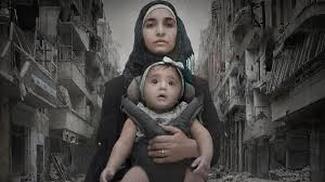 It is not easy to be recommending people to watch a film that is, in places, almost impossible to watch, but I do! “For Sama” is a documentary of life for a family and a community living through the siege of Aleppo, Syria. On the one hand it could be viewed as a place of destruction and death, yet I have not viewed a film that is in reality more full of hope than this. I imagine that, for many, hope is most often a lifting of the spirit and a strong sense of optimism. This documentary demonstrates some of the worst in human nature but, more importantly, also some of the best in human nature and a profound hope that faces the inevitability of death. I find much in this that is part of the Christian story, as rehearsed between Palm Sunday and Easter. As the story of the siege of Aleppo plays out in a largely Muslim setting, I am encouraged that the Christian story is not exclusive, and that the hope God offers through the life, death and resurrection of Jesus is indeed universal. Rather strangely, ‘For Sama’ has gained attention through the awards offered by the film industry (Cannes, the BAFTAs and Oscars etc.). While this glitzy world is so far removed from the situation in Syria, it has helped fulfil the purpose of the film to give identity to people who are disregarded by those in positions of power. The film’s creator Waad al-Kateab had a dress made for the Oscars award ceremony emblazoned with words from an Arabic poem ‘We dared to dream and we will not regret dignity.’ - there is no shame in seeking and holding on to one’s identity and purpose. The reality of the situation in Aleppo, particularly during the days of the siege, that is displayed by the film ‘For Sama’ might be described by many as hopeless. A small population standing against the regime of Bashar al-Assad and the threats of Russian air power, amidst threats from competing militia groups in the city, yet continuing to find within themselves and their faith in God the strength and the hope to seek life. It is not rosy. It is gritty and it is very real. At the opening of the film we are thrust into the risky public protests of students and others. They loudly celebrate the simple act of protest, which has not been possible before, and in this glimpse a hope that their revolution might succeed. This story of a city and its people is also very personal. The student Waad keeps encountering Hamza, a doctor who has committed to providing much needed hospital care to the besieged and constantly threatened population of East Aleppo. He is a subject for Waad’s filming, but common cause, shared hardship and hope draw them together. That everyday life, relationships and love continue in the dust and destruction is the defiant hope that undergirds the wider story the film tells. Waad and Hamza get married and there is space for the celebration with some of the trimmings you would expect, joy and dancing. But life is punctuated continuously by bombing attacks and the call to attend to the injured and dying. The bloody scenes of death and destruction are not easy viewing, but even here hope lies in the tireless efforts of the medics and the desperate desires of family that life should prevail. There is the regular invocation of God to be active in what is happening - ‘God help us!’ - and the chorus of ‘God be praised’ when life is restored. And it reaches beyond, for even when a mother is carrying her dead son away she is encouraged to ‘Pray for him’. It is in the midst of this chaos that Sama is born and the natural hope of an infant discovering life and a new world is evident. The greater hope is witnessed, however, in an emergency caesarean birth as the mother in rushed in having been caught in a bomb attack. The medical team make long and vigorous efforts to encourage the first breath of a very blue baby. Both mother and baby survive and one realises the hope that lies in perseverance. Hope is not always obvious. It is likely seen when the family are able to travel to Turkey to visit elderly parents. However, there is more hope when the family make the decision to return to Aleppo as a family in order to continue their work in the hospital and filming the story of a suffering people. How hope-less would it have been if the people of Aleppo were abandoned by such committed and principled people? There are the scenes of desperate digging in the rubble of bombed-out buildings, the final scenes of a convoy leaving the city for a safe destination, within which hope goes hand-in-hand with great risk and sacrifice. If you watch this film it is certain that you will discover other examples of hope writ large in the midst of human catastrophe. The strength of the human spirit simply expresses the presence of the Spirit of God. I cannot think that hope comes from any other source. Watch 'For Sama' on Channel4 or via AmazonPrime. It is due in cinemas later in 2020. A Channel4 'How to Change the World' interview between Waad and Hamza al-Kateab and Krishnan guru-Murthy can be viewed here. 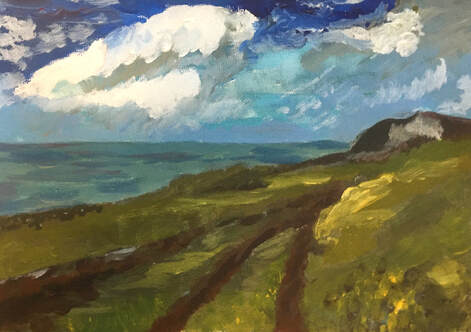 I suspect that none of us would like to be labelled as being 'narrow-minded', as it is closely associated with intolerance and bigotry and is a term we might well associate with individuals with whom we would not wish to be associated. However, the reality is that. while we may not be 'narrow-minded' we could all be a lot more 'broad-minded'. The horizons within which we live our lives are almost inevitably closer than they might be. Part of this is naturally down to our mental and emotional capacities. In an increasingly global society we should consider the situation of others in far-flung parts of the world. The climate crisis, exacerbated most by the industrialised and consumer societies, is affecting people in the pacific islands due to sea levels, those in vast areas of the African continent, dependent on simple agriculture, due to worsening drought or flood. We need to, and perhaps want to, understand better these situations in order that we might find motivation to change our own lifestyles, yet it is impossible to put ourselves fully into another's shoes. The world around us constantly invites us to 'look beyond' what immediately presents itself to us. Standing on a cliff-top near Nefyn in Wales we have the touchable at our feet, but are invited by the wheel-tracks in the turf to view the distance whether that is the history of their origins, the rocky outcrop at the furthest point of land, the sea-horizon which takes our imagination around the oceans, the wind-blown clouds which tease thoughts of where they have come from and where they are going to, the blue sky which is a rather plain view of a complex universe and space more visible in the stars at night. In the realms of faith the broader view is, in my view, also better. My ecumenical work in the church has enriched what I consider to be mine immeasurably. I am also aware that as soon as I feel I have God sussed I wander into the realms of idolatry, placing my belief above the God who, while being intimate with us through the life of Jesus, is always 'beyond' in a measure. Some would counsel not looking too far ahead, as you may then trip up on what is at your feet, but in the greater economy of God I think I need to take in as much of the horizon as my mental and emotional capacities can handle, trusting that God is always more as well as being always near to prevent me tripping up. 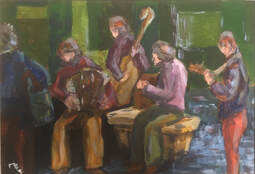 The first thought that comes to my mind is a link to an earlier post 'God likes Jazz'. In the band each person plays a different instrument, none have any scripted music, to hear them individually one would witness different music but together they make harmony and music. In the image this is not evident, except that they all face the same way! This group, playing in a square in Rome one summer, were clearly enjoying themselves and were full of enthusiasm, drawing their audience into the rhythm and the melody of their music, which had originally been composed by another. This always strikes me as a clear image of Christian life and witness - we pick absorb the music of another in order to play our part sharing it for the benefit of others with enthusiasm and joy. But we each do it in our own way with the particular gifts which are ours, contributing to a whole. This evening we will enjoy the annual City of Birmingham Symphony Orchestra and Chorus' Christmas concert which I anticipate will be just this, but on a much bigger scale. I'm just glad that the wearing of silly hats is not an obligatory part of being a Christian! |
Archives
March 2024
|
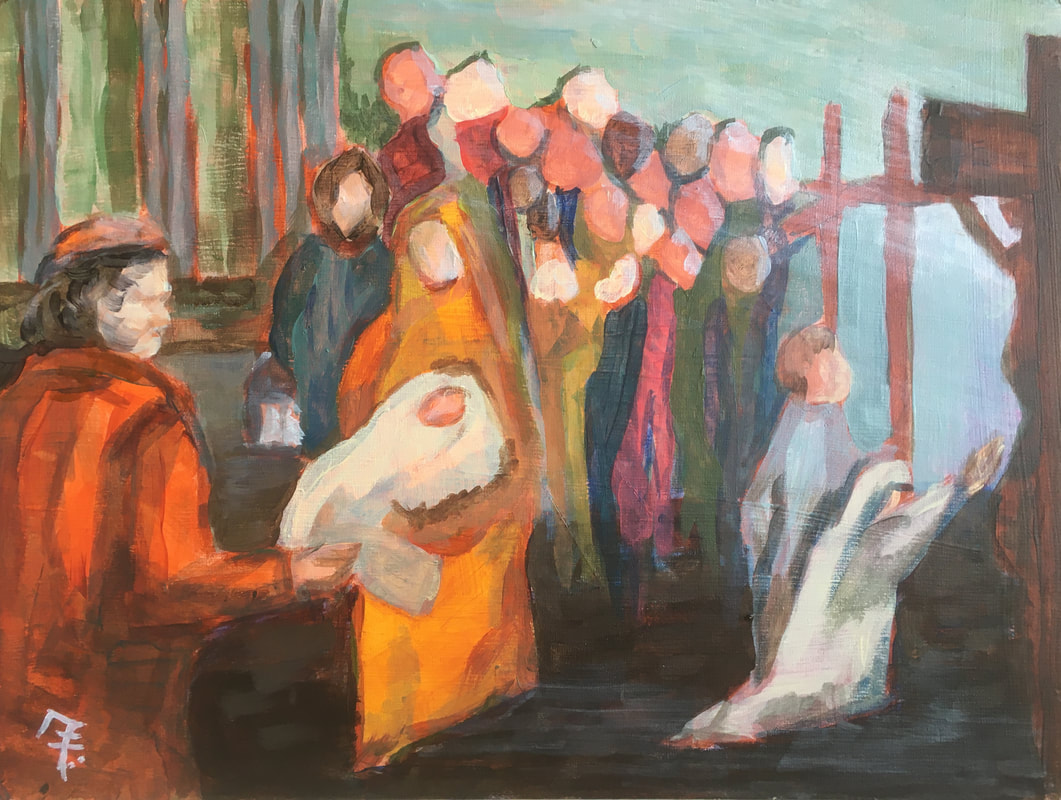
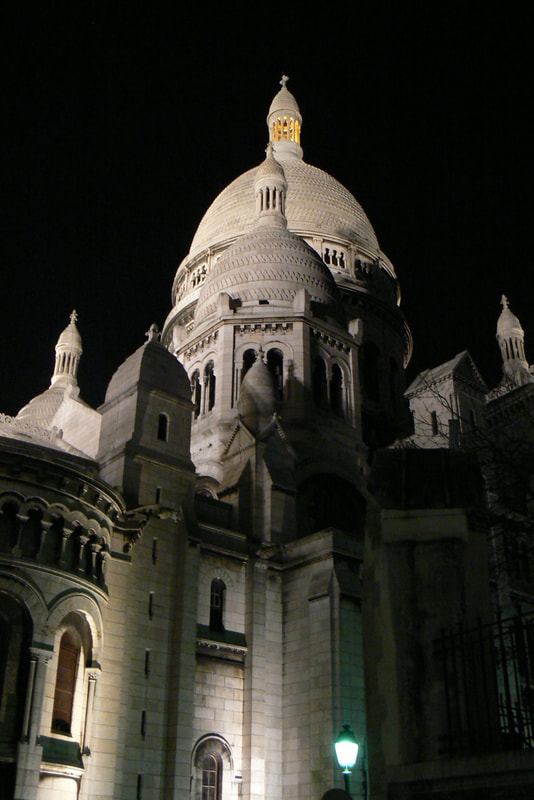
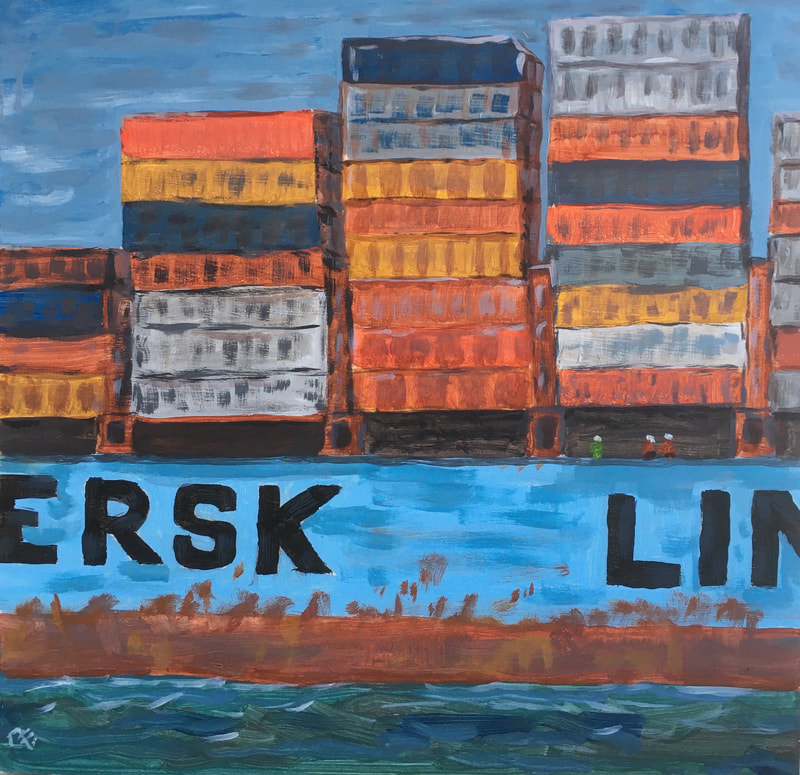
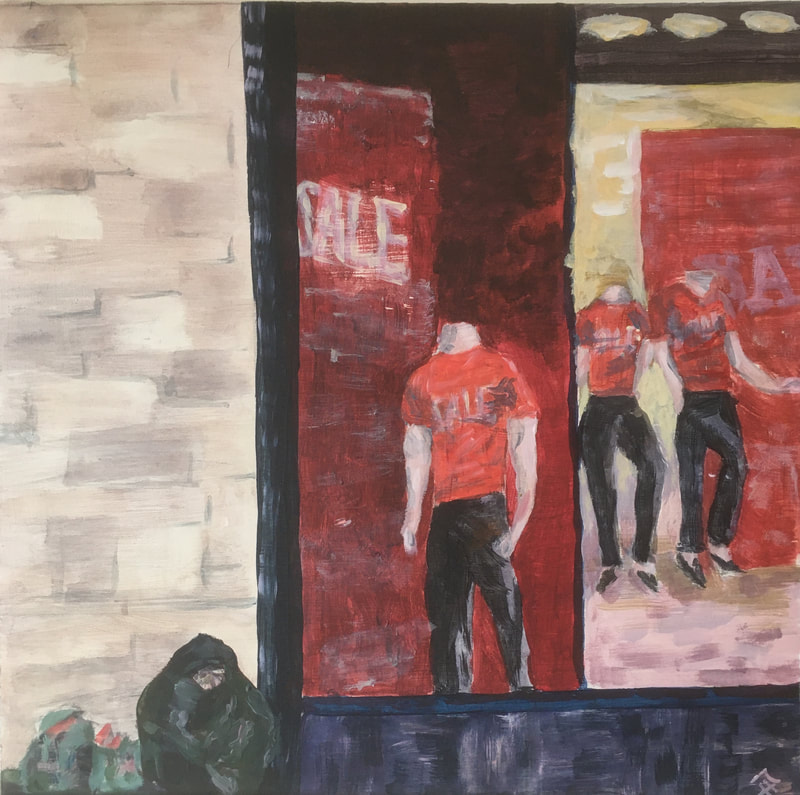
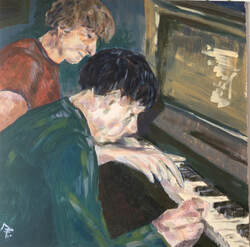
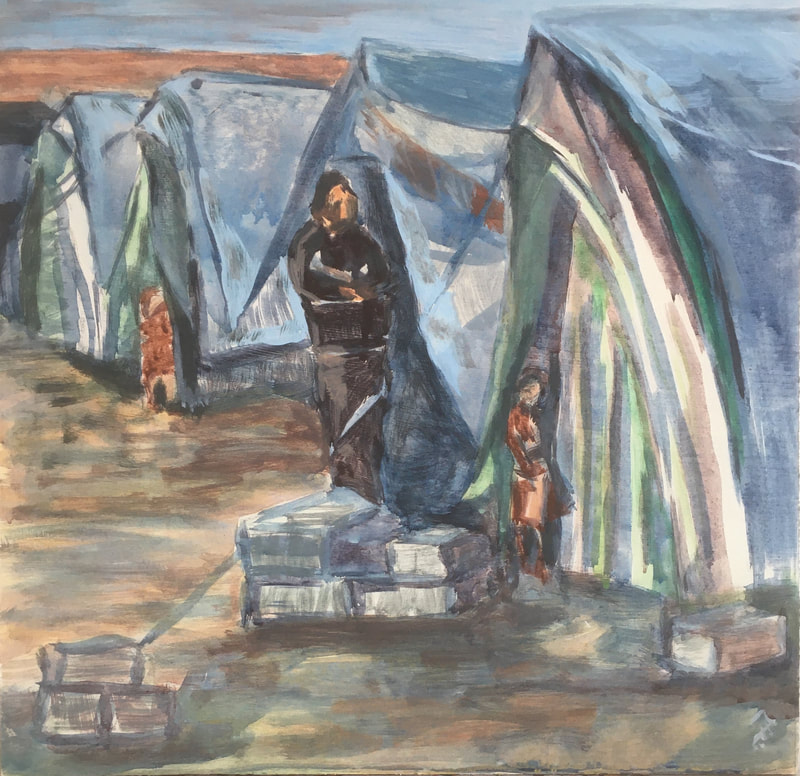
 RSS Feed
RSS Feed
